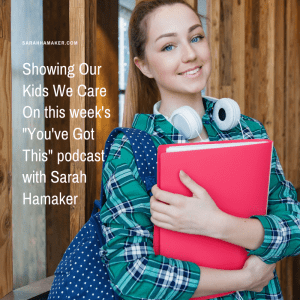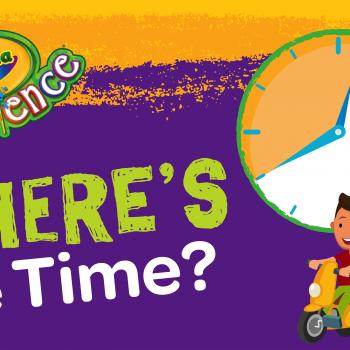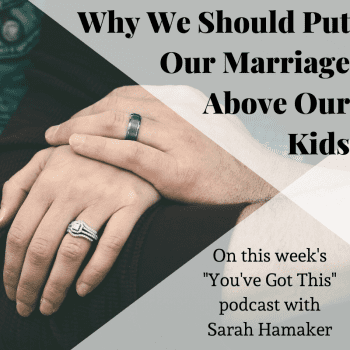 The following is an excerpt from my interview with Lynn Zakeri on my podcast, You’ve Got This.
The following is an excerpt from my interview with Lynn Zakeri on my podcast, You’ve Got This.
Lynn is a therapist in the Chicago area whose passion is to help people figure out what is wrong and help them feel better again. She has experience working with children, adolescents, adults and families on many issues, including anxiety, depression, transitions, work ethics/motivation, young adult goal setting, self-esteem, anger, family dysfunction (present or past), marital therapy, new mom stress, social skills, trauma, self-harming and eating disorders. Lynn enjoys assisting in the progress and achievement of attaining goals. She has worked in the school setting and private practice. Lynn serves on many committees. When she is not working, she is a wife, daughter, sister and mother.
With our children, we should be a little more aware of some of the signs we need look for where they may need extra help navigating this extremely high pressure world they live in. We really want to make sure that we’re paying attention to our kids and their mental health, especially as it relates to their school work in middle and high school. Have you found that kids today really kind of are more aware of how they’re doing in school than we were?
Lynn: I think it’s a given now that kids will check their grades online a lot. There’s this almost judgment if you’re not trying. When we were high school, those were the cool kids. They could get away with not trying. Now, if you’re not trying, it’s what’s wrong with you?
I also think too, it can be so easy to check your progress these days. Teachers are posting things online almost immediately. Our kids never have the, “Oh, I can’t find out how I did on that test for another week, so I’m not going to worry about it,” because there is near instantaneous feedback that plays a part in their I think plays a part in their anxiety about school or just over-concern about their grades.
Lynn: There’s a lot of that starting when kids are a little too young to handle that. Because when they’re younger, that need to please teachers is really strong. I don’t think kids really identify self-wise what kind of student they are, and the kids rely on their teachers to define that for them. So if a teacher has put in a zero because of human error, and a 10- or 11-year-old sees that their grade just went from 99 to a 70 or something like that, that’s going to cause a lot of anxiety all night long.
I feel like part of my job as a parent is to be that, “It’s okay. It’s not that big a deal. You still have other tests or projects to hand in.” I feel like I haven’t really had to push my kids to do better in school. I’ve had to kind of encourage them to back off on some of that, and I think that’s just my kids. Some parents are going to have the opposite where they wish their kids would care more about it. But I just find it interesting that this instantaneousness as society has really spilled over into the academic world.
Then we have the whole social media, social part of it, which is all about likes and “Do they like my pretty Instagram picture,” and really take into heart all these things that happen to celebrities who live. My kids are really into K-pop (Korean pop), and these groups are halfway around the world. So what happens with those celebrities doesn’t really impact them, and yet it does because of social media. Which leads me to the question: How has social media changed our teens and their social life?
Lynn: I just wrote a blog post about how teenagers, instead of basing their day on how many likes they received, it’s about what group chat they’re included in. If you have been kicked out of a group chat or a group chat was created without you versus, “Oh, they added me to their group chat and now my life is fantastic.” This has become a really defining thing as opposed to “They sat with me at lunch.” Now it’s, “I’m added to the group chat. I am in,” and then it’s maintaining that in-ness.
I think that’s almost taking the place of the likes on Instagram and the likes with all those other social media. Those who are in their upper 20s are on Facebook; younger 20s are doing a lot of Instagram; then the younger teens are still much more focused on the Snapchat group messages. While they follow Instagram and they scroll through it, the real social stuff happens on Snapchat.
And with smartphones and tablets, the social media is never off.
Lynn: I’ll tell you a personal story. I said to my oldest got a smartphone going into 8th grade, “You can get Snapchat on your phone when you can come to us and explain why it will make your life better. You need to be able to just explain that.” Honestly, he didn’t come to us until he was second semester of his freshman year and said, “My whole soccer team is making plans for practices on Snapchat.” That was easier for us to say yes to because his coach was doing it as well. The team had their own little group. So then he had Snapchat and sadly he’s never looked back.
I think one of the hardest things for parents is to recognize that our kids have an even harder time developing those boundaries themselves, right, because their brains are not as developed as ours.
Lynn: And recognizing what makes them feel bad. If you’re looking at it and it’s making you feel bad about yourself—whether somebody is posting about you or you are seeing what people did when they told you they weren’t hanging out, or someone was supposed to get back to you and they didn’t, then you see they’re out and about. It really, really does a number on anybody for a lot of good reasons. It would do a number on me. It’s a lot to take in and teenagers are so young to take in all that stimulation. It’s really overwhelming.
Can you talk a little bit about maybe some things that we could be on the lookout for to help our teens?
Lynn: The number one thing? Is your teen sleeping. I say that to my kids: “You know your friends that aren’t sleeping now? Those are the ones that are going to be in therapist’s office one day.” It’s so true. But for some kids, it’s really hard. It’s not just that easy to be like, “Go to sleep. Get 8 or 9 or 10 hours of sleep.” It’s really hard for a lot of kids because they’re sad, they’re anxious, they’re stressed out. But if there’s ways you as a parent can put in boundaries to ensure that good sleep hygiene. All the way through high school, it is our responsibility to teach that sleep is a priority.
I hierarchy sleep for all of my clients and follow that in my family too – sleep followed by nutrition, followed by exercise, followed by medication. That’s the hierarchy that I personally like to follow. There’s a zillion strategies that I have and I offer when kids are having trouble sleeping even when it’s driven by depression and anxiety to help them settle their head and get that quality sleep because that is going to make your mood off. How do you feel when you don’t have a good night’s sleep? I know I’m more susceptible to crabbiness and even tears if I’m not well-rested. So that’s #1.
Then, I also think that depression can be so easily masked by numbing behaviors. So, watch what your kids do a lot of, like binge watching shows at a higher rate than before. Think about why are they checking out? Why are they trying not to think for so many hours a day? And if it’s because of stress and good reasons and they deserve a break, that’s okay to validate, but let’s find some ways to bring them joy rather than just checking out.
I loved what you said about how they use it to kind of numb their mind and check out. I think that is an important distinction because they don’t want to be alone with their thoughts. When our kids can’t be without their phones, that’s a sign that hey, something’s a little off here if they can’t put it in the family basket at night. We make our kids charge their phones and computers far away from their bedrooms.
Lynn: There’s a million things that fall under the numbing, but I think the helpless feeling as a parent is a really scary feeling. I think if all parents go back to trusting themselves then they’re just fine. Listen to your gut. If your kid is different, follow through and ask. And it’s okay to be wrong. I think kids want to be cared about even if you’re wrong. It’s okay to say, “Hey, sit with me for a sec. What’s going on? How are you? Tell me something good.” They make those jokes since we were kids about driving the car with your kid and not looking at them. If you have a dog, walk your dog with your kids. Our kids do want to talk to us. We should just ask questions and be non-judgmental in our questions, not “Did you win the game?” but “How did you feel about the game? How do you think you did? How do you think the test went?” Not “Did you study for the test?” or “That’s what happens when you don’t study.”
For teenagers, my job is moving into more that mentor type relationship so that they can successfully make these decisions knowing that I’ve got their back. I’m there and helping them to move forward into adulthood because that’s my goal. My goal is not to have a kid who’s dependent on me their whole life. My goal is to help them to launch into adulthood so they can live their own life.
Lynn: You want to be able to celebrate them, and I think so desperately they want to be celebrated because who’s celebrating them in their lives? The kids are all trying to survive. They’re all trying to just not have a bad day. But if we can celebrate our kids, it does go a long way.
To hear more great advice and stories from Lynn, listen to “Showing Our Kids We Care” on the “You’ve Got This” podcast.












